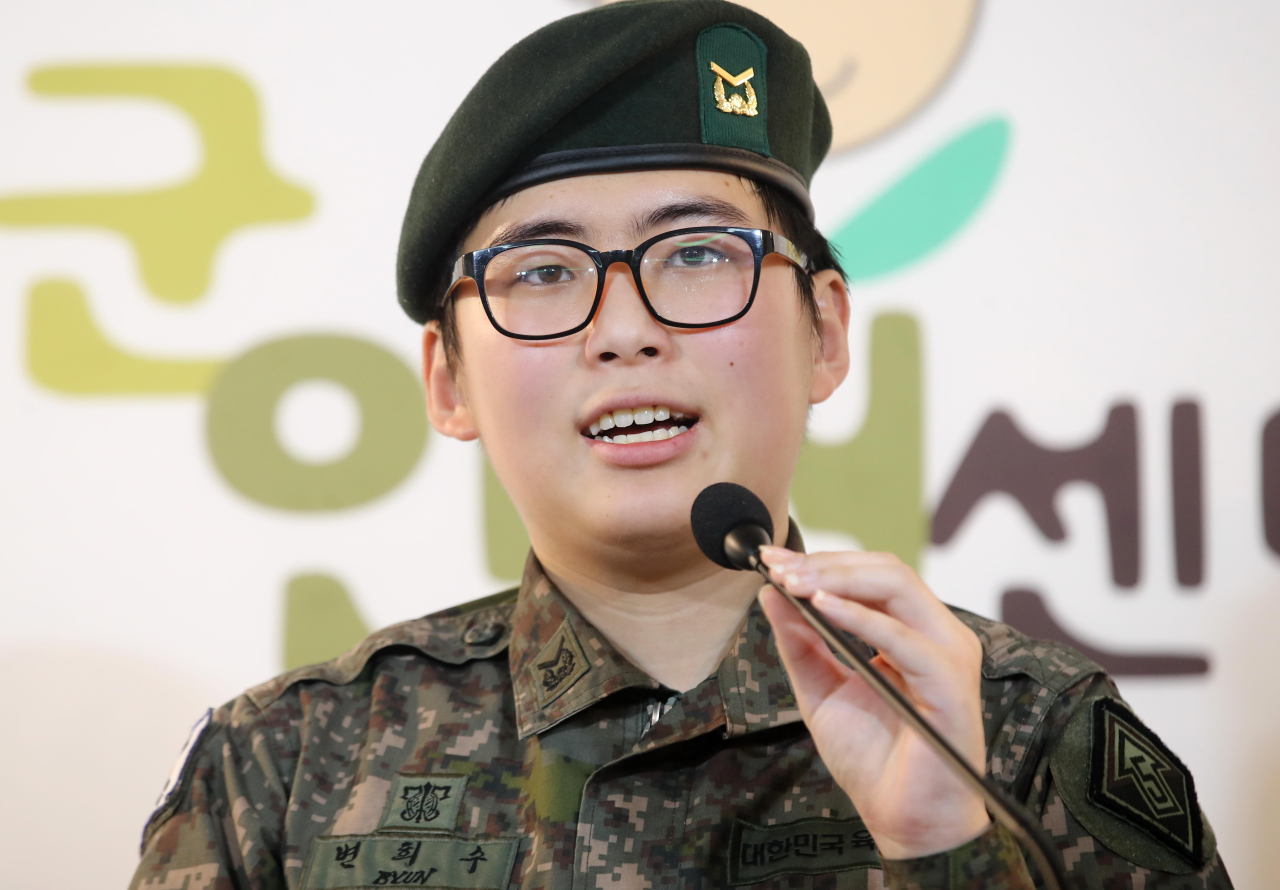Byun Hee-soo, South Korea’s first transgender soldier, who was discharged from the military last year after undergoing sex reassignment surgery, is battling her way back into the Army.
In January 2020, the Army fired the former staff sergeant, a tank gunner who served at an armored unit in Gyeonggi Province, saying the surgery rendered her mentally and physically unfit to be on active duty. Byun wanted to remain in the military as a female.
In August, Byun petitioned the court to reverse the decision, after she was denied a chance to make her case before the Army’s appeals commission. But the court has yet to set a trial date and the Army has not submitted its pleadings.
“Two weeks ago, I asked the court again for a date, and that’s all I’ve been doing for the past months. Still no answer. I have no idea what’s taking so long,” Kim Borami, an attorney representing Byun, told The Korea Herald.
“It’s been a painful time for Byun and me,” the attorney said, adding the thought of seeking damages in a separate complaint crossed her mind as her client, the 23-year-old former sergeant, is left waiting endlessly to realize her childhood dream of being a career soldier.
Is the loss of genitalia a disorder?In December, the Human Rights Commission sided with Byun, saying there is no corroborating evidence to rule her health condition unfit to be on active duty. The Army’s decision to fire Byun because of her surgery was arbitrary, it said.
The watchdog’s conclusion, which is not legally binding, did little to persuade the Army to revisit Byun’s discharge, with a senior official toeing the line.
“It was a decision based on law. We will take the next step once the court ruling is out,” a senior Army official said, referring to the Military Personnel Act, which says the loss of genitalia constitutes as a mental and physical disorder.
Byun’s attorney disputes the assertion, saying Byun underwent “medical treatment” and that the Army is discriminating against one’s sexual identity if it refuses to see it that way.
Worse, the military is free to deem the result of any medical treatment a disorder, if it goes down that road, the attorney added.
In 2008, Lt. Col. Pi Woo-jin, a first-generation female helicopter pilot, was discharged because she had mastectomy to treat breast cancer, and the military deemed the changes resulting from the procedure to be a disorder.
Pi took the case to court, won and returned to active duty until her retirement.
Starting over to continue servingStill, some remain unsympathetic to Byun’s cause, noting she should start at square one to be a female soldier, because that would be fair to her female colleagues. Men and women go through a separate screening process to be noncommissioned officers in the Army.
“This is about setting a precedent. If she is allowed to serve as a female, what message does it send to those thinking the same action? What does the Army say to that?” said Moon Seong-mook, chief of Unification Strategy Center at the Korea Research Institute for National Strategy.
Moon, a retired one-star Army general, stressed that the military could not “simply make the transition.”
Byun’s attorney disagreed. “Men and women could undergo separate tests to enlist, but what they do out in the field after that -- that’s not fundamentally different,” she said, adding her client, a former tank gunner, wants to carry on in the same role.
The attorney added that the Army should not sanction discrimination by folding to voices saying Byun would not survive the work environment.
“But would everyone there welcome her back and could she just pick up where she left off? I seriously don’t know,” said Kim Ki-ho, a retired Army colonel.
The Center for Military Human Rights Korea, a watchdog based in Seoul, said, “It would be irresponsible of the Army to let go one of its own because they had gender reassignment surgery.”
But, even if Byun were to reapply, she would not get through the initial physical fitness screening. The military rules transgender candidates unfit to serve. According to the military code, they cannot take part in military service unless war breaks out. Even then, only some transgender individuals would be called to duty.
“This whole case against Byun is ridiculous,” the attorney Kim said, adding that Byun is a fully able-bodied soldier who has already proven to be capable of carrying out her duty. Many others see that, Kim noted, referring to a recent reversal of a ban on transgender troops serving in the US military.
In late January, US President Biden overturned the controversial ban to enable “everyone qualified” to serve openly and with pride.
By Choi Si-young (
siyoungchoi@heraldcorp.com)








![[From the Scene] At this Starbucks, you need ID: Franchise opens store with view of North Korea](http://res.heraldm.com/phpwas/restmb_idxmake.php?idx=644&simg=/content/image/2024/11/29/20241129050068_0.jpg)